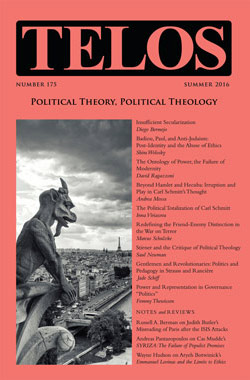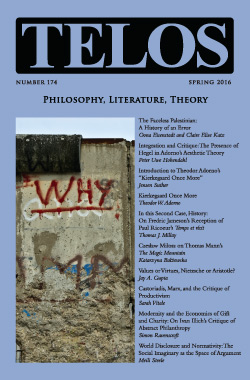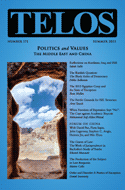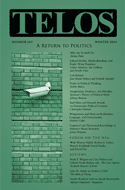 Critical theory inherited the mission of philosophy to know the world and to pursue the good life. Careful examination should shed light on the cosmos and our place within it and contribute to a beneficial ordering of human concerns, when wisdom informs governance. Yet that aspiration to know the world encountered the limits of intelligibility, beyond which reason could not proceed. Meanwhile, the efforts to remake the world in the spirit of reason elicited processes of rationalization, as deleterious to the world around us, the natural environment, as to the world within us, the ongoing cultural crisis of modernity and its social corollaries. That is Horkheimer and Adorno’s dialectic of enlightenment at the foundation of the critical theoretical tradition that continues to provide a framework with which to articulate a critique of the contemporary in its many heterogeneous facets: the disruption of all forms of solidarity, the pressures on family structures, the erosion of educational opportunities, the growing gap between rich and poor. Add to this the ominous shifts in the international order, including the breakdown of state structures from North Africa through the Middle East, the strains on the European Union, and the return of a repressive semi-dictatorship in Russia, while—at this point in the presidential election season—the United States seems to be tumbling dangerously toward Weimar conditions.
Critical theory inherited the mission of philosophy to know the world and to pursue the good life. Careful examination should shed light on the cosmos and our place within it and contribute to a beneficial ordering of human concerns, when wisdom informs governance. Yet that aspiration to know the world encountered the limits of intelligibility, beyond which reason could not proceed. Meanwhile, the efforts to remake the world in the spirit of reason elicited processes of rationalization, as deleterious to the world around us, the natural environment, as to the world within us, the ongoing cultural crisis of modernity and its social corollaries. That is Horkheimer and Adorno’s dialectic of enlightenment at the foundation of the critical theoretical tradition that continues to provide a framework with which to articulate a critique of the contemporary in its many heterogeneous facets: the disruption of all forms of solidarity, the pressures on family structures, the erosion of educational opportunities, the growing gap between rich and poor. Add to this the ominous shifts in the international order, including the breakdown of state structures from North Africa through the Middle East, the strains on the European Union, and the return of a repressive semi-dictatorship in Russia, while—at this point in the presidential election season—the United States seems to be tumbling dangerously toward Weimar conditions.
|
I was invited to speak on this panel, having been reassured that it would be devoted to academic boycotts in general, but I cannot say that I was surprised to discover that half of the titles here advocate one and only one boycott target. I will therefore make some remarks concerning academic boycotts in general, to which I object on principle, but also comment on the campaign against Israeli universities in particular. I expect that we will hear boycott proponents denounce the apartheid character of Israeli society or policies of genocide and other such mythologies that the boycott movement has disseminated and which the APA may eventually be asked to endorse. But let’s leave the propaganda for the discussion section. Traveling in Paris, Judith Butler published a “letter” dated November 14, in English on the Verso blog and in French in Libération, the day after the ISIS attacks, entitled “Mourning becomes the Law.” The short text treats two phenomena and argues for a connection between them: the process of mourning the victims of the attacks and the expansion of counter-terrorist practices by the state. Butler’s thesis is that the shared grieving of the dead served exclusively as a vehicle to justify amplified police powers: in this sense, mourning becomes the law, or at least law enforcement. A close look at her claims, however, shows significant deficiencies in the account of mourning and an important misreading of the Parisian response. Telos 174 (Spring 2016): Philosophy, Literature, Theory is now available for purchase in our store. Telos 171 (Summer 2015) is now available for purchase in our store. Telos 169 (Winter 2014) is now available for purchase in our store. |
||||
|
Telos Press Publishing · PO Box 811 · Candor, NY 13743 · Phone: 212-228-6479 Privacy Policy · Data Protection Copyright © 2025 Telos Press Publishing · All Rights Reserved |
||||

 Standard accounts of American politics invoke an oscillation between idealist and realist inclinations. The idealists appeal to principles, which they identify as fundamental to the American polity, especially those enshrined in the founding documents: life, liberty, and the pursuit of happiness, transformed into a broad democratization agenda. Of course, revisionist critics have no difficulty in pointing out the failure of that agenda, i.e., the extent to which the empirical history of the country fell far short of realizing its ideals. Yet even that critique, smugly put forward to debunk naïve idealism, in some basic ways is itself indebted to the same idealism, insofar as the complaint of insufficient democratization also implies a call for more democracy, the very core of the idealist program. This is why neo-conservatives and their left-liberal adversaries always had more in common than met the eye (as was abundantly clear to traditional conservatives).
Standard accounts of American politics invoke an oscillation between idealist and realist inclinations. The idealists appeal to principles, which they identify as fundamental to the American polity, especially those enshrined in the founding documents: life, liberty, and the pursuit of happiness, transformed into a broad democratization agenda. Of course, revisionist critics have no difficulty in pointing out the failure of that agenda, i.e., the extent to which the empirical history of the country fell far short of realizing its ideals. Yet even that critique, smugly put forward to debunk naïve idealism, in some basic ways is itself indebted to the same idealism, insofar as the complaint of insufficient democratization also implies a call for more democracy, the very core of the idealist program. This is why neo-conservatives and their left-liberal adversaries always had more in common than met the eye (as was abundantly clear to traditional conservatives).  In recent years, there has been much hand-wringing over widespread apathy, not only among young generations but throughout the public. Politics, so critics have been claiming, has become a matter exclusively of media manipulation, of a manufactured consensus foisted on a malleable citizenry. This dystopian vision allegedly held not only in the United States (although perhaps especially here) but across much of the globe. Democratization movements appeared to have been crushed, whether in Iran or China, as the leadership in the West—once the premier advocate of democratic transformation—opted instead for the realpolitik of deals with rulers, no matter how unsavory, over support for popular movements, no matter how just.
In recent years, there has been much hand-wringing over widespread apathy, not only among young generations but throughout the public. Politics, so critics have been claiming, has become a matter exclusively of media manipulation, of a manufactured consensus foisted on a malleable citizenry. This dystopian vision allegedly held not only in the United States (although perhaps especially here) but across much of the globe. Democratization movements appeared to have been crushed, whether in Iran or China, as the leadership in the West—once the premier advocate of democratic transformation—opted instead for the realpolitik of deals with rulers, no matter how unsavory, over support for popular movements, no matter how just. 

